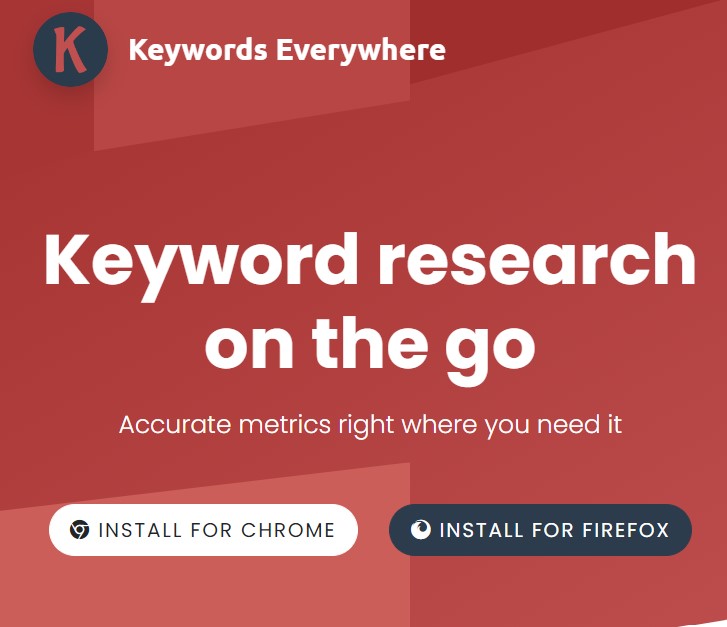It’s very possible that if you have an Etsy shop, you also have an ecommerce website that uses Google SEO. Keyword research for Etsy is one thing, but finding good keywords for Google is a totally different thing.
How should you find keywords for sites that rely on Google SEO?
As a general rule, the best way to find Google keywords for an ecommerce site is to go to Google, and your own Google stats. By then using that information to research on the actual search result pages, you can decide which keywords to target in order to increase your site’s presence on Google.
There are also some tools that you can use that will shortcut the process a little bit, but you need to be careful and understand what those tools are telling you. You also need to use your own judgment, so that’s a big piece of it.

Table of Contents
- Where to start doing keyword research for eCommerce sites.
- The problem with eCommerce site SEO.
- Where to find free keywords for eCommerce sites.
- Paid tools to use for eCommerce keyword research.
- Use your own judgment when doing keyword research.
Some of the links in this article are affiliate links that will pay a small commission if they’re used to purchase something. To see the entire affiliate policy click here.
Where to start doing keyword research for eCommerce sites.
The first place to start is going to be your own stats, because that will give you the actual information about your site’s traffic. By checking to see what keywords you’re actually being found for already, you can use that information as a starting point to find related terms to target.
To get that information, you’ll need to have your site connected to Google Analytics and Google Search Console.
and Google Search Console.
The steps for both of these are fairly straightforward, but it’s better to hook up Analytics first because it’s used to validate a lot of other Google products.
Go to Google Analytics to set this up, and be aware that they’re rolling out the new(ish) GA4 analytics at this point, so it’s best to set your site up with that code. Some sites aren’t compatible with the new GA4 code yet, though, so if that’s the case use the older version until they update the site.
You’ll have to check with your site’s help section to find out where to set the code up, since every site is different.
Once you get some data coming in, you’ll be able to see where all of your traffic is coming from on Google Analytics, and which keywords are being used to find it on Google using the Search Console data.
If you’re interested in getting into the strategy of all of this and seeing the setup of my website, you can sign up for my SEO Club For Websites Vlog where I documented the first year of my website’s growth last year.
where I documented the first year of my website’s growth last year.
After you have some data coming in, it will be easier to see what’s going on with your site. But if you don’t have that information to give you a direction, you can just use your common sense and some free or inexpensive tools to get a read on which types of keywords will work for your site.
The problem with eCommerce site SEO.
The problem with doing SEO for an eCommerce site is the competition for every keyword you find. It doesn’t matter what keyword you’re looking at, if Google thinks it’s a “buying intent” keyword, you’re going to be competing with Amazon, Etsy, eBay, Walmart, and any number of craft supply retailers.
It’s hard to get to the top of Google search results, but it can be done with time and effort.
It’s going to take at least 6-8 months, and probably longer, before you see any real results with this, and that’s after you actually put in the effort. That’s just how Google works.
It’s taken my site a year and a half to get to the top of Google search for the long tail keyword “purple edible butterflies.” Yes, that’s right, a year and a half.
And in that time I was using a lot of strategies that go beyond just keywords to get to the point that Google sees my site as an authority for that keyword, so it was more complicated than using the term in titles on my website.
This video shows my website ranking above Amazon, Walmart and Etsy for the term. I also like the fact that the Etsy result is showing my listing, ha ha ha!
If you look at the rest of the results, though, a lot of the image results and video results are also taken from my listings and youtube channel, so there’s a lot that goes into it beyond choosing the right keywords.
However, you have to start with keyword selection, because if you choose keywords that are too competitive you’ll never be able to outrank Amazon in Google search.
Where to find free keywords for eCommerce sites.
After checking your own stats to get an idea of what keywords you’re already being found for, you can take some of those and put them into Google’s Ads Keyword Planner tool. This is found inside the Google Ads dashboard, and it gives you information about the predicted traffic volume for keywords if you run an ad that targets them.
Now, keep in mind that this isn’t actual search volume, it’s traffic estimates for people who are planning on buying Google ads.
However, it will give you a rough idea of which keywords are very competitive, and which ones are going to be easier for you to be found for.
Also remember that every tool that reports on keyword search or traffic volumes is only reporting for that one specific keyword. You might target one keyword and then get a lot more traffic based on variations of that, or on related searches.
For example, “purple edible butterflies” shows my website at the top of search results. So does “edible butterflies purple.” But “edible purple butterflies” shows it under Amazon’s result, so it doesn’t place as well for that version.
However, I’ll still get traffic for that, so just because the keyword tools say that you’re going to get X number of visits for a keyword, it’s never going to be totally accurate. You might end up getting more or less, but the estimates the tools provide are a decent starting point to go with.
Another free tool (or method) that I’ve used is the Keyword Golden Ratio, which is a blogging thing that Doug Cunnington of Niche Site Project came up with. This is mostly for bloggers, but the concept is interesting and definitely works for ecommerce too.
The idea behind the Keyword Golden Ratio, or KGR, is that you can find keywords that Google doesn’t have an exact match for by looking for really niche keywords, and by using them you can rank faster and higher on Google than you normally would.
The search volume for these keywords is usually on the low side, but remember that if you’re found for one keyword, there are going to be variations on it that you’ll also be found for.
Paid tools to use for eCommerce keyword research.
I use Google keyword planner sometimes, but I usually shortcut that by using a paid Chrome extension called Keywords Everywhere. It basically pulls in data from Google Ads directly onto the search results page and it saves you time going back and forth.
This is a paid tool, but it’s really inexpensive, and you pay based on the credits that you use. You can check it out here using my affiliate link: Keywords Everywhere.
I use this all the time because it gives you a quick idea about the Google stats for everything that you type into the search bar on every site it works on. It also works on Etsy, but you have to remember that it’s showing Google data, not Etsy search volume, when you do that.

There are also a lot of other paid tools that give you a huge amount of data about different things on your website, but those probably aren’t anything that you would need when you’re starting out. Some of those include Ahrefs (I use that one), Semrush, etc.
One important thing to remember is that these tools all use different systems to calculate your “domain authority,” and they base that on your site’s backlinks.
You shouldn’t worry too much about that, because Google doesn’t look at those numbers, it’s something the tools themselves make up so that people can see progression in their links.
The other important thing to remember is that all of the numbers on every tool are only estimates. They’re reporting on the one specific keyword you’re looking at, not on all the variations.
Like I mentioned above, one part of your website can be found for a lot of different variations on a search term.
The tools only tell you what they’re estimating for the one specific term you type in, so there might be a lot of keywords that you’re found for based on only targeting one specific one.
The most important tool to use, though, is your brain.
Use your own judgment when doing keyword research.
When you start looking into keywords to use for your eCommerce site, you’re going to find a lot that seem like they could work, but at the same time, seem really weird. You need to use your own judgment and knowledge of your category and products to make the final decision about which keywords to use, never rely blindly on any tool.
When I do keyword research for my site, I usually start with a keyword tool to find something that looks promising. Then I go to Google, do some searches, and look to see what sites come up for those keywords.
If everything is dominated by Amazon and Etsy, and I think that the keyword looks too general, I don’t bother concentrating on that keyword.
I look for terms that are less competitive so that I have a chance of making it onto the first page of Google without having to overtake Amazon.
I might try a more specific keyword that would have less competition to see what those results look like, or I could go into the tools to get some quick suggestions.
The best tool that you have, though, is your brain and your own eyes. If you see that a tool is telling you that a keyword is great, but you can see that the first page of Google search is loaded with high-authority sites that you probably can’t beat out, pass on that keyword and move on to a different one.
By choosing the keywords that you target carefully, you’ll be able to give yourself a good chance of getting to the top of Google, even if it takes a year and a half.

